小学英语总复习动词专项练习
- 格式:doc
- 大小:42.00 KB
- 文档页数:11
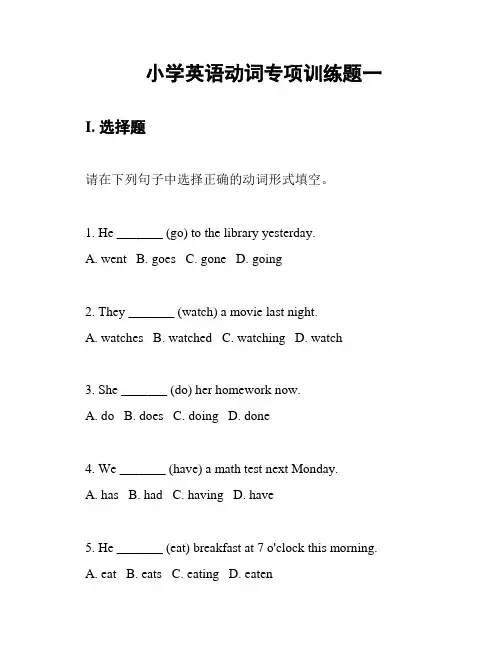
小学英语动词专项训练题一I. 选择题请在下列句子中选择正确的动词形式填空。
1. He _______ (go) to the library yesterday.A. wentB. goesC. goneD. going2. They _______ (watch) a movie last night.A. watchesB. watchedC. watchingD. watch3. She _______ (do) her homework now.A. doB. doesC. doingD. done4. We _______ (have) a math test next Monday.A. hasB. hadC. havingD. have5. He _______ (eat) breakfast at 7 o'clock this morning.A. eatB. eatsC. eatingD. eatenII. 填空题请根据句子意思,用正确的动词形式填空。
1. My mother _______ (cook) dinner every evening.2. They _______ (play) soccer in the park yesterday afternoon.3. We _______ (visit) my grandparents last weekend.4. The cat _______ (sleep) on the sofa now.5. She _______ (do) her homework and then _______ (go) out to play.III. 改写句子请将下列句子改写为含有情态动词的句子。
1. He can ride a bike.2. She knows how to swim.3. They are able to speak English.4. We must finish our work before lunch.5. You should study hard every day.IV. 完成句子请根据所给的提示,完成下列句子。
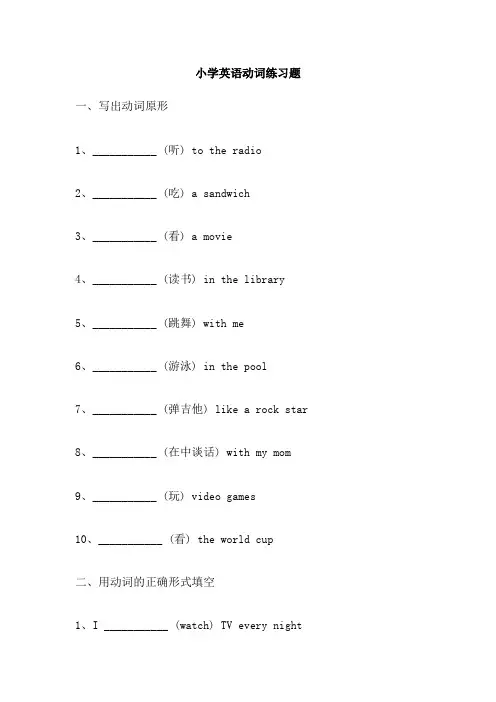
小学英语动词练习题一、写出动词原形1、___________ (听) to the radio2、___________ (吃) a sandwich3、___________ (看) a movie4、___________ (读书) in the library5、___________ (跳舞) with me6、___________ (游泳) in the pool7、___________ (弹吉他) like a rock star8、___________ (在中谈话) with my mom9、___________ (玩) video games10、___________ (看) the world cup二、用动词的正确形式填空1、I ___________ (watch) TV every night2、He ___________ (play) basketball every Saturday3、They ___________ (go) to the park on Sundays4、My mother ___________ (cook) dinner every day5、Do you ___________ (like) to play with toys?6、She ___________ (not watch) TV on school nights7、It ___________ (take) me 20 minutes to walk to school8、He ___________ (come) home from work at 6:00 p.m. every day9、We ___________ (not play) in the street10、They ___________ (have) a good time at the party last night。
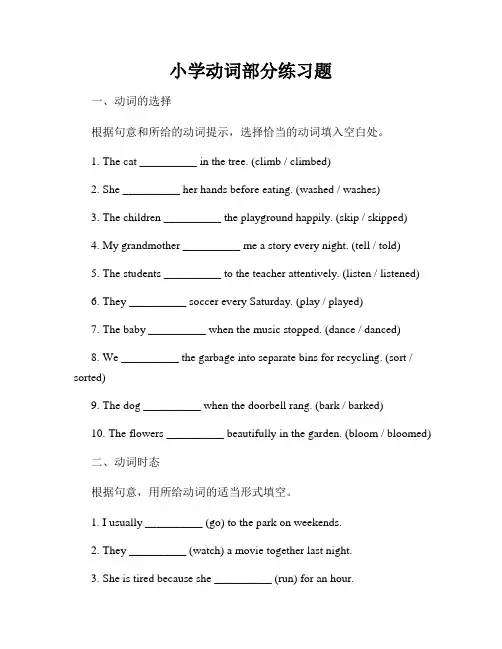
小学动词部分练习题一、动词的选择根据句意和所给的动词提示,选择恰当的动词填入空白处。
1. The cat __________ in the tree. (climb / climbed)2. She __________ her hands before eating. (washed / washes)3. The children __________ the playground happily. (skip / skipped)4. My grandmother __________ me a story every night. (tell / told)5. The students __________ to the teacher attentively. (listen / listened)6. They __________ soccer every Saturday. (play / played)7. The baby __________ when the music stopped. (dance / danced)8. We __________ the garbage into separate bins for recycling. (sort / sorted)9. The dog __________ when the doorbell rang. (bark / barked)10. The flowers __________ beautifully in the garden. (bloom / bloomed)二、动词时态根据句意,用所给动词的适当形式填空。
1. I usually __________ (go) to the park on weekends.2. They __________ (watch) a movie together last night.3. She is tired because she __________ (run) for an hour.4. The students __________ (study) English every day.5. Tom __________ (play) the piano at the concert tomorrow.6. We __________ (visit) our grandparents next week.7. My brother __________ (read) a book in his room now.8. The birds __________ (sing) sweetly in the morning.9. They usually __________ (have) dinner at 7 o'clock in the evening.10. It __________ (rain) heavily when I left the house.三、动词的进行时根据句意,将动词转化成进行时填入空白处。
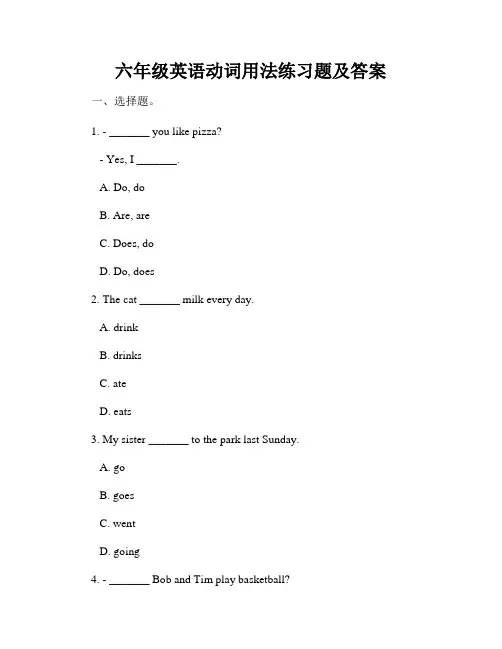
六年级英语动词用法练习题及答案一、选择题。
1. - _______ you like pizza?- Yes, I _______.A. Do, doB. Are, areC. Does, doD. Do, does2. The cat _______ milk every day.A. drinkB. drinksC. ateD. eats3. My sister _______ to the park last Sunday.A. goB. goesC. wentD. going4. - _______ Bob and Tim play basketball?- Yes, they _______.A. Do, doB. Are, areC. Does, doD. Do, does5. We _______ television every evening.A. watchB. watchesC. watchedD. watching二、用括号内所给动词的适当形式填空。
1. He usually _______ (go) swimming on weekends.2. Yesterday, they _______ (visit) the museum.3. The dog _______ (bark) loudly last night.4. We _______ (play) soccer every Saturday.5. She _______ (cook) dinner for her family every day.三、改错题。
下面每句话中有一处错误,请找出并改正。
1. I doesn't like to eat vegetables. _______2. They was playing basketball in the park. _______3. He don't want to go to the party. _______4. We goes to the movies last night. _______5. She have a lot of friends at school. _______答案一、选择题。
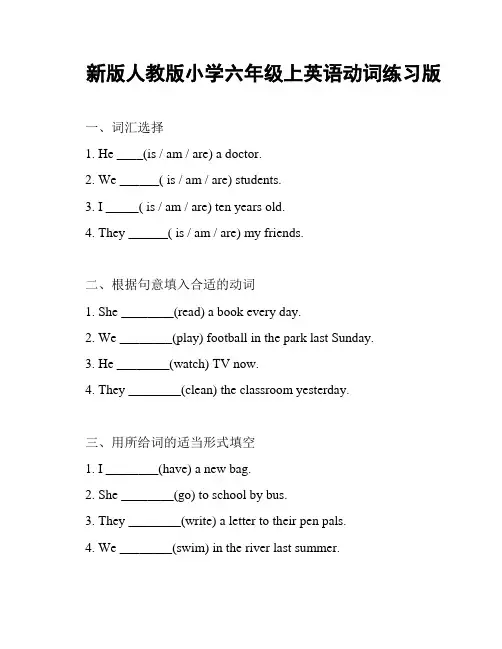
新版人教版小学六年级上英语动词练习版一、词汇选择1. He ____(is / am / are) a doctor.2. We ______( is / am / are) students.3. I _____( is / am / are) ten years old.4. They ______( is / am / are) my friends.二、根据句意填入合适的动词1. She ________(read) a book every day.2. We ________(play) football in the park last Sunday.3. He ________(watch) TV now.4. They ________(clean) the classroom yesterday.三、用所给词的适当形式填空1. I ________(have) a new bag.2. She ________(go) to school by bus.3. They ________(write) a letter to their pen pals.4. We ________(swim) in the river last summer.四、连词成句1. is she how old_________________________________________.2. do you what like_________________________________________.3. can this what do you_________________________________________?4. she swimming is where_________________________________________.五、阅读理解365 days in a year. People work five days a week. They rest for two days. They have holidays, too. They rest for about two months in summer. They also have a few days off in the spring and autumn. At the end of each year, people have a long holiday, it is called the New Year holiday. People don't work for a week or longer.根据短文内容,选择正确的答案。
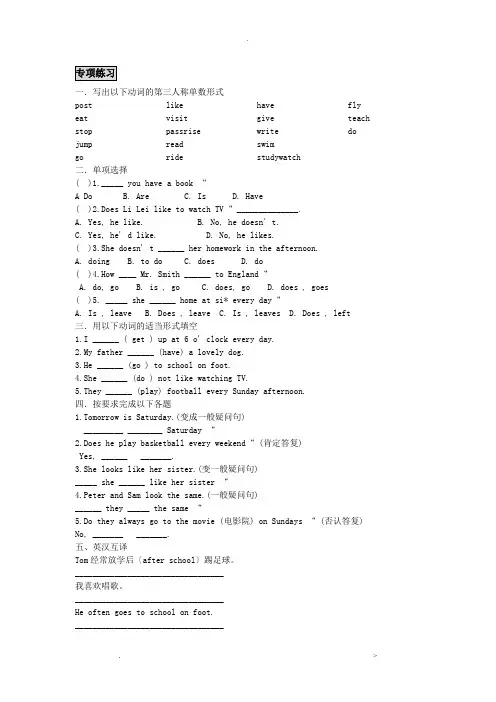
一.写出以下动词的第三人称单数形式post eat stop jump go likevisitpassrisereadridehavegivewriteswimstudywatchflyteachdo二.单项选择( )1._____ you have a book “A Do B. Are C. Is D. Have( )2.Does Li Lei like to watch TV“ ______________.A. Yes, he like.B. No, he doesn’t.C. Yes, he’d like.D. No, he likes.( )3.She doesn’t ______ her homework in the afternoon.A. doingB. to doC. doesD. do( )4.How ____ Mr. Smith ______ to England“A. do, goB. is , goC. does, goD. does , goes( )5. _____ she ______ home at si* every day“A. Is , leaveB. Does , leaveC. Is , leavesD. Does , left 三.用以下动词的适当形式填空1.I ______ ( get ) up at 6 o’clock every day.2.My father ______ (have) a lovely dog.3.He ______ (go ) to school on foot.4.She ______ (do ) not like watching TV.5.They ______ (play) football every Sunday afternoon.四.按要求完成以下各题1.Tomorrow is Saturday.(变成一般疑问句)_________ ________ Saturday “2.Does he play basketball every weekend“ (肯定答复)Yes, ______ _______.3.She looks like her sister.(变一般疑问句)_____ she ______ like her sister “4.Peter and Sam look the same.(一般疑问句)______ they _____ the same “5.Do they always go to the movie (电影院) on Sundays “ (否认答复) No, _______ _______.五、英汉互译Tom经常放学后〔after school〕踢足球。
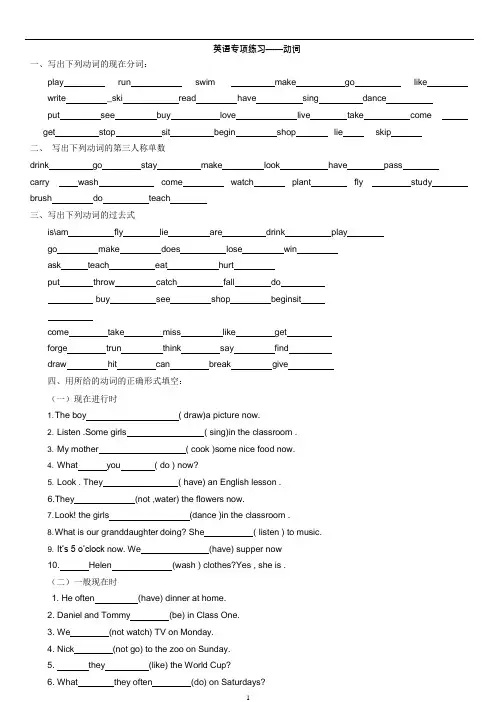
英语专项练习——动词一、写出下列动词的现在分词:play run swim make go like write _ski read have sing danceput see buy love live take come get stop sit begin shoplie skip二、写出下列动词的第三人称单数drink go stay make look have passcarry wash come watch plant fly study brush do teach三、写出下列动词的过去式is\am fly lie are drink playgo make does lose winask teach eat hurtput throw catch fall dobuy see shop beginsitcome take miss like getforge trun think say finddraw hit can break give四、用所给的动词的正确形式填空:(一)现在进行时1. The boy ( draw)a picture now.2. Listen .Some girls ( sing)in the classroom .3. My mother ( cook )some nice food now.4. What you ( do ) now?5. Look . They ( have) an English lesson .6.They (not ,water) the flowers now.7. Look! the girls (dance )in the classroom .8. What is our granddaughter doing? She ( listen ) to music.9. It’s 5 o’clock now. We (have) supper now10. Helen (wash ) clothes?Yes , she is .(二)一般现在时1. He often (have) dinner at home.2. Daniel and Tommy (be) in Class One.3. We (not watch) TV on Monday.4. Nick (not go) to the zoo on Sunday.5. they (like) the World Cup?6. What they often (do) on Saturdays?7. your parents (read) newspapers every day?8. The girl (teach) us English on Sundays.9. She and I (take) a walk together every evening.10. There (be) some water in the bottle.11. Mike (like) cooking.12. They (have) the same hobby.13. My aunt (look) after her baby carefully.14. You always (do) your homework well.15. I (be) ill. I’m staying in bed.16. She (go) to school from Monday to Friday.17. Liu Tao (do) not like PE.18. The child often (watch) TV in the evening.19. Su Hai and Su Yang (have) eight lessons this term.20. -What day (be) it today?-It’s Saturday(三)综合练习21. My mother(buy) a book for me yesterday.22. I like to (fly a kite).23. Don’t the house. Mum it yesterday. (clean)24. What you just now? I some housework. ( do)25. They (make) a kite a week ago.26. I want to apples. But my dad all of them lastmonth.( pick )27. he the flowers this morning? Yes, he . (water)28. She (be) a pretty girl. Look, she (do) Chinese dances.29. The students often (draw) some pictures in the art room.30.What Mike do on the farm? He cows. (milk)31. It (be) Ben’s birthday last Friday.32. We all (have) a good time last night.33. He (jump) high on last Sports Day.34. Helen (milk) a cow on Friday.35. She likes newspapers, but she a book yesterday. (read)36. He football now, but they basketball just now. (play)37. Jim’s mother(plant) trees just now.38. they (sweep) the floor on Sunday?No, they .39. I (watch) a cartoon on Monday.40. We (go) to school on Sunday.41. He (live) in Wuxi two years ago.42. The cat (eat) a bird last night.43. We (have) a party last Halloween.44. Nancy (pick) up oranges on the farm last week.45. I (make) a model ship with Mike yesterday.46. They (play) chess in the classroom last PE lesson.47. My mother (cook) a nice food last Spring Festival.48. The girls (sing) and (dance) at the party now.49. It (be) the 2nd of November yesterday.Mr. White (go) to his office by car.50. G ao Shan (put) the book on his head a moment ago.51. Today is a Sunny day. We (have) a picnic this afternoon.52. My brother (go) to Shanghai next week.53. Tom often (go) to school on foot. But today is rain.He (go) to school by bike.54. What do you usually do at weekends? I usually(watch)TV and (catch) insects?55. It’s Friday today. What she (do) this weekend?She (watch) TV and (catch) insects.56. What (d0) you do last Sunday?I (pick) apples on a farm.What you (do) next Sunday? I (会)go to the farm.57. Mary (visit) her grandparents tomorrow.58. Liu Tao (fly) kites in the playground yesterday.59. David (give) a puppet show next Monday.60. I (plan) for my study now61 、I62. Her father (watch) a cartoon on Saturday.(read) a newspaper last night.63. We to zoo yesterday, but they to the park. (go)64. you (visit) your relatives last Spring Festival?65. he (fly) a kite on Sunday? Yes, he .66. Gao Shan (pull) up carrots last National Day holiday.67. I (sweep) the floor yesterday, but my mother .68. What she (find) in the garden last morning?She (find) a beautiful butterfly.69. Yesterday, I went to the gym to(play )ping-pong.70. Can you fly a kite ?72. Did you to the zoo yesterday?No,I to the park.(go)73. Listen! The girl( sing ) a song.六、用be 动词的适当形式填空1. I a boy. you a boy? No, I not.2. The girl Jack's sister.3. The dog tall and fat.4. The man with big eyes a teacher.5.6. Where your brother in the classroom?your mother? She at home.7. How your father? 8. Mike and Liu Tao at school.9. Whose dress this? 10. Whose socks they?11. That my red skirt. 12. Who I?13.The jeans on the desk. 14.Here a scarf for you.15. Here some sweaters for you. 16. The black gloves for Su Yang. 17. This pair of gloves for Yang Ling. 18. The two cups of milk for me. 19. Some tea in the glass. 20. Gao shan's shirt over there.21. My sister's name Nancy. 22. This not Wang Fang's pencil.23. David and Helen from England? 24. There a girl in the room.25. There some apples on the tree. 26. there any kites in the classroom?27. there any apple juice in the bottle?28. There some bread on the plate.29. There a boy, two girls, three men and ten women in the park.30. You, he and I from China.七、句型转换1. Daniel watches TV every evening.(改为否定句)2. I do my homework every day.(改为一般疑问句,作否定回答)3. She likes milk.(改为一般疑问句,作肯定回答)4. Amy likes playing computer games.(改为一般疑问句,作否定回答)5. We go to school every morning.(改为否定句)6. He speaks English very well.(改为否定句)7. I like taking photos in the park.(对划线部分提问)8. John comes from Canada.(对划线部分提问)9. She is always a good student.(改为一般疑问句,作否定回答)10. Simon and Daniel like going skating.(改为否定句)11. They are doing housework .(分别改成一般疑问句和否定句)12. The students are cleaning the classroom . ( 改一般疑问句并作肯定和否定回答)13. I’m playing the football in the playground .(对划线部分进行提问)14. Tom is reading books in this study . (对划线部分进行提问)15. Nancy is going to go camping.(改否定)16. I’ll go and join them.(改否定)17. I’m going to get up at 6:30 tomorrow.(改一般疑问句)18. We will meet at the bus stop at 10:30.(改一般疑问句)19. She is going to listen to music after school.(对划线部分提问)20. My father and mother are going to watch a game the day after tomorrow.(同上)21. It was exciting.否定句:一般疑问句:肯、否定回答:22. All the students were very excited.否定句:一般疑问句:肯、否定回答:八. 用所给动词的适当形式填空:1. He TV every evening. (watch)2. We always to school on foot. (go)3. Tom, with his classmates, often football after school. (play)4. Your shoes under the bed. (be)5. here and by me. (come, stand)6. His uncle usually to work by bus. (go)7. I always up at six in the morning.(get)8. John like his father. (look)九. 完成句子,根据所给中文意思,在空白处填入适当词语完成句子。
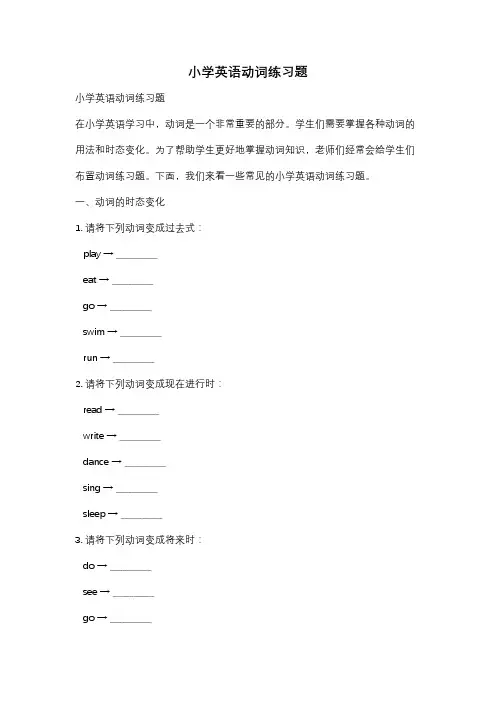
小学英语动词练习题小学英语动词练习题在小学英语学习中,动词是一个非常重要的部分。
学生们需要掌握各种动词的用法和时态变化。
为了帮助学生更好地掌握动词知识,老师们经常会给学生们布置动词练习题。
下面,我们来看一些常见的小学英语动词练习题。
一、动词的时态变化1. 请将下列动词变成过去式:play → __________eat → __________go → __________swim → __________run → __________2. 请将下列动词变成现在进行时:read → __________write → __________dance → __________sing → __________sleep → __________3. 请将下列动词变成将来时:do → __________see → __________go → __________eat → __________play → __________二、动词的用法1. 请用适当的动词填空:I __________ (like) ice cream.They __________ (watch) a movie now.She __________ (play) the piano very well.We __________ (study) English every day.He __________ (run) in the park every morning.2. 请用适当的动词完成句子:My mother __________ (cook) dinner every evening.The cat __________ (sleep) on the sofa.They __________ (play) basketball in the gym.Tom __________ (ride) his bike to school every day.We __________ (listen) to music in the car.三、动词的选择1. 请选出正确的动词形式填空:I __________ (am / is / are) a student.He __________ (like / likes / liking) to play soccer.They __________ (go / goes / going) to the park on weekends. She __________ (is / am / are) reading a book now.We __________ (are / is / am) going to the zoo tomorrow.2. 请选出正确的动词填空:The cat __________ (jump / jumps / jumping) over the fence.They __________ (run / runs / running) in the race.I __________ (swim / swims / swimming) in the pool.She __________ (play / plays / playing) the guitar very well.We __________ (dance / dances / dancing) at the party.以上是一些常见的小学英语动词练习题。
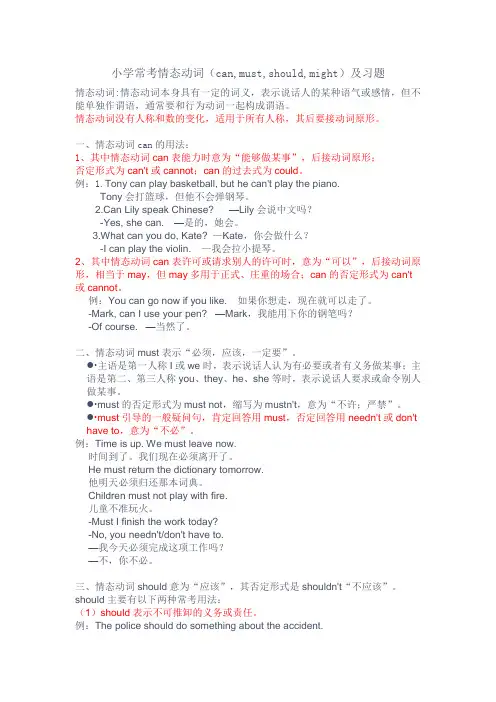
小学常考情态动词(can,must,should,might)及习题情态动词:情态动词本身具有一定的词义,表示说话人的某种语气或感情,但不能单独作谓语,通常要和行为动词一起构成谓语。
情态动词没有人称和数的变化,适用于所有人称,其后要接动词原形。
一、情态动词can的用法:1、其中情态动词can表能力时意为“能够做某事”,后接动词原形;否定形式为can't或cannot;can的过去式为could。
例:1.Tony can play basketball, but he can't play the piano.Tony会打篮球,但他不会弹钢琴。
2.Can Lily speak Chinese? —Lily会说中文吗?-Yes, she can. —是的,她会。
3.What can you do, Kate? —Kate,你会做什么?-I can play the violin. —我会拉小提琴。
2、其中情态动词can表许可或请求别人的许可时,意为“可以”,后接动词原形,相当于may,但may多用于正式、庄重的场合;can的否定形式为can't 或cannot。
例:You can go now if you like. 如果你想走,现在就可以走了。
-Mark, can I use your pen? —Mark,我能用下你的钢笔吗?-Of course. —当然了。
二、情态动词must表示“必须,应该,一定要”。
●∙主语是第一人称I或we时,表示说话人认为有必要或者有义务做某事;主语是第二、第三人称you、they、he、she等时,表示说话人要求或命令别人做某事。
●∙must的否定形式为must not,缩写为mustn't,意为“不许;严禁”。
●∙must引导的一般疑问句,肯定回答用must,否定回答用needn't或don'thave to,意为“不必”。
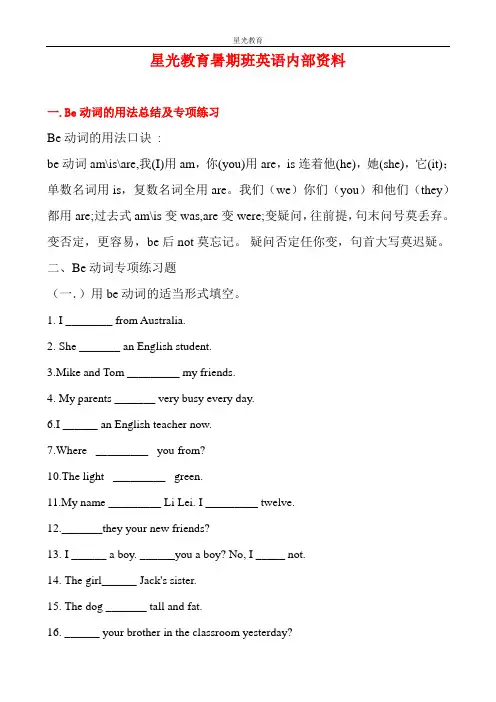
星光教育暑期班英语内部资料一.Be动词的用法总结及专项练习Be动词的用法口诀:be动词am\is\are,我(I)用am,你(you)用are,is连着他(he),她(she),它(it);单数名词用is,复数名词全用are。
我们(we)你们(you)和他们(they)都用are;过去式am\is变was,are变 were;变疑问,往前提,句末问号莫丢弃。
变否定,更容易,be后not莫忘记。
疑问否定任你变,句首大写莫迟疑。
二、Be动词专项练习题(一.)用be动词的适当形式填空。
1. I ________ from Australia.2. She _______ an English student.3.Mike and Tom _________ my friends.4. My parents _______ very busy every day.6.I ______ an English teacher now.7.Where _________ you from?10.The light _________ green.11.My name _________ Li Lei. I _________ twelve.12._______they your new friends?13. I ______ a boy. ______you a boy? No, I _____ not.14. The girl______ Jack's sister.15. The dog _______ tall and fat.16. ______ your brother in the classroom yesterday?17. Where _____ your mother? She ______at home.18. Whose dress ______ this?19.That ______ my red skirt.20.Who ______ I?21. Some tea ______ in the glass.22.Jhon ______ busy last weekend..23. My sister's name ______Nancy.24. This ______ not Wang Fang's pencil.25. ______ David and Helen from England?26. We ____ friends.27. She ___ a teacher.28. I ___ a girl.29. Many ants ____ in my house.30.His mother ____ fat.(二.)写出下列词适当形式:1.I am (缩略形式) ______2.is (复数)______3.we are (缩略形式) ______4.are not(缩略形式) ______5.is not (缩略形式) ______6.is/am(过去式形式) ______7.she's(完整形式) ______ 8.it's(完整形式) ______9.they're(完整形式) ______ 10.are(过去式形式) ______(三. )将下列句子变成否定句和一般疑问句,再作肯定和否定回答。
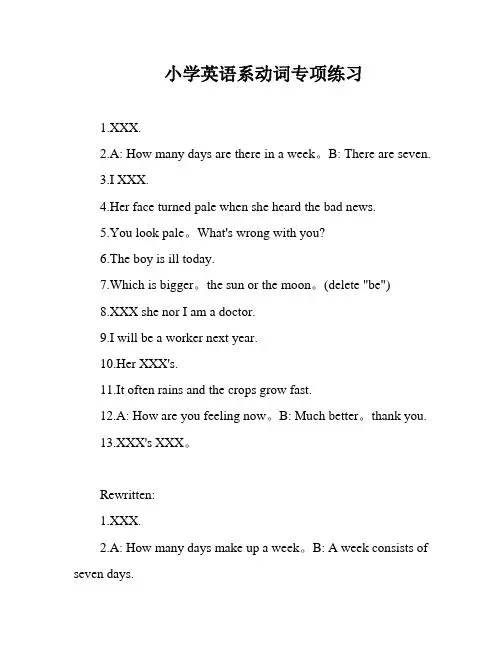
小学英语系动词专项练习1.XXX.2.A: How many days are there in a week。
B: There are seven.3.I XXX.4.Her face turned pale when she heard the bad news.5.You look pale。
What's wrong with you?6.The boy is ill today.7.Which is bigger。
the sun or the moon。
(delete "be")8.XXX she nor I am a doctor.9.I will be a worker next year.10.Her XXX's.11.It often rains and the crops grow fast.12.A: How are you feeling now。
B: Much better。
thank you.13.XXX's XXX。
Rewritten:1.XXX.2.A: How many days make up a week。
B: A week consists of seven days.st night。
I XXX fatigue.4.Upon receiving negative news。
her n XXX pale.5.Your XXX troubling you?6.The young boy is XXX.7.Which celestial body has a larger size。
the sun or the moon。
8.XXX nor the other person possess a medical degree.9.In the ing year。
I will be XXX.10.The sound of her voice XXX's.11.XXX.12.A: How do you presently feel。
动词专项练习一(解析版答案)一、找出不同类的单词。
(B)1、A. ate B. fly C. bought D. did解析:ate、bought、did是动词过去式,fly是动词原形,故选B(D)2、A. run B. swim C. walk D. her解析:run、swim、walk是动词原形,her是人称代词(A)3、A.want B.went C.played D.cooked解析:want是动词原形,went、played、cooked是动词过去式(C)4、A.took B.did C.swim D.hurt解析:took、did、hurt是动词过去式,swim是动词原形。
(C)5、A.read B.could C.drink D.came解析:read、could、came是动词过去式,drink是动词原形。
二、用be动词的适当形式填空(做此类题目应当遵从主谓一致原则,主语是单数,be动词是单数形式,主语是复数,be动词是复数形式)1、Is your father a worker. Yes, he is.解析:your father主语,属于第三人称单数,遵从主谓一致原则,所以后面的Be动词应是is.2、They are in the classroom.解析:They是人称代词,是复数形式,遵从主谓一致原则,所以后面的Be动词应是are.3、Where are my books?解析:books是名词复数形式,遵从主谓一致原则,所以Be动词应是are4、These are her pears.解析:pears是名词复数形式,遵从主谓一致原则,所以Be动词应是are5、How much is the T-shirt?解析:how much意为“多少钱”时,可单独使用,也可构成词组how much money,但英语中常省略money,用来询问某物的价钱、价格。
how much后接be动词时,be是单数还是复数,取决于be之后的名词,T-shirt是名词单数形式。
小学英语动词练习题一、单选题1. The cat ________ in the garden.A. sleepingB. sleepC. sleeps2. He ________ basketball every weekend.A. playB. playsC. playing3. My mother ________ delicious food for us.A. cookB. cooksC. cooking4. They ________ to school by bus.A. goB. goesC. going5. We ________ a picnic in the park tomorrow.B. hasC. having二、完形填空Amy is a 1 girl. She is always full of 2 and likes 3 sports. Every day, after school, Amy goes to the playground. She can 4 basketball and football very well. She 5 swimming, too. Her father often takes her to the swimming pool on weekends.Amy's family 6 in a small town near the beach. They 7 a beautiful house. There is a big garden in front of their house. Amy and her father often 8 in the garden. They 9 all kinds of flowers and vegetables there. Amy loves 10 flowers the most.1. A. happyB. sadC. tired2. A. lifeB. energyC. toys3. A. playingB. studyingC. watchingB. playsC. playing5. A. lovesB. likeC. liking6. A. liveB. livesC. lived7. A. hasB. haveC. having8. A. playB. playsC. playing9. A. plantingB. plantC. plants10. A. smellingC. smell三、根据所给情境,选择恰当的动词完成句子1. --- What do you usually do after school?--- I ________ soccer with my friends.A. playB. playingC. plays2. --- Look! The dog is hungry.--- Let's ________ him some food.A. feedB. feedingC. feeds3. --- Where is your sister?--- She is ________ a book in her room.A. readingB. readsC. read4. --- Can you help me clean the classroom?--- OK. I ________ my best.A. tryB. tryingC. tries5. --- How was your vacation?--- I ________ so much fun at the beach.A. haveB. hasC. had四、根据图画选择正确的动词补全句子1. The boy ________ a book in the library.A. readsB. readingC. read2. The girl ________ a picture with crayons.A. drawB. drawsC. drawing3. The boy and girl ________ on the seesaw in the park.B. playsC. playing4. The cat ________ to catch the butterfly.A. tryB. triesC. trying5. The children ________ a soccer game on the field.A. haveB. hasC. had五、阅读理解My name is Peter. I am a student at Green School. I like to play sports with my friends. After school, we often go to the playground. We can play basketball, football, and volleyball there. My favorite sport is basketball. I play it every day. On weekends, my parents take me to the swimming pool. I love swimming because it's fun and good exercise.1. Peter is a ________.A. teacherB. student2. Peter's favorite sport is ________.A. basketballB. footballC. volleyball3. Peter goes to the playground ________ school.A. beforeB. afterC. during4. Peter goes swimming ________.A. every dayB. on weekendsC. after school5. Peter likes swimming because it's ________.A. difficultB. boringC. fun六、按要求转换下列句子1. He plays soccer every Sunday. (改为否定句)He ________ soccer every Sunday.2. They have breakfast at home. (改为一般疑问句)________ they ________ breakfast at home?3. She likes to swim in the pool. (改为一般疑问句)________ she ________ to swim in the pool?4. We played basketball last week. (改为一般疑问句)________ you ________ basketball last week?5. My father can cook delicious food. (改为否定句)My father ________ cook delicious food.七、根据上下文补全对话A: Hi Tim. What ________ (do) you usually do on weekends?B: I often ________ (play) computer games or ________ (watch) movies at home. How about you?A: I ________ (practice) baseball with my friends in the park. It's fun.B: That sounds great. Can I join you next time?A: Of course. We ________ (have) a lot of fun together.八、按照要求完成句子1. I swim in the pool every day. (改为否定句)I ________ ________ in the pool every day.2. They can speak three languages. (改为一般疑问句)________ they ________ three languages?3. Amy often helps her mother clean the house. (对划线部分提问) ________ ________ Amy often do?4. The students watched a movie last night. (改为一般疑问句)________ the students ________ a movie last night?5. We have a math test tomorrow. (改为否定句)We ________ ________ a math test tomorrow.。
Read、circle and correct1. I am going to swimming in the lake.2. Jenny and I watch TV tomorrow.3. Is this building high and low4. How many exercise do you need5. Everyone are going to wake up at seven.A.My mother like apple.B. I am a pupil.C. I am a boy, I have three ears.D.My English teacher are Ms Gao.E. She have a beautiful dress.F.My mother always go to work at 7:30 in the morning.G.He lives in Beijing.H.I don't my homework at school.I. Tom often goes to school on foot last year.1. Lily often do her homework after supper.2. Are there some children in the classroom3. How much is the runners4. How many teacher are there in our school5. Li Ming often goes to school by a bike.l. Jenny go to school five times a week.3. Did you bought snacks4. You don't have a book, I don't have too.5. The words son and sun is different.3、history museum.9、other students.10、.12、day.15、16、st now.19、28、31、32、her.33、34、36、eeting the day after tomorrow.37、38、39、in tomorrow.40、for me three weeks ago. If you41、here a moment ago.) a book about animalsl. swimming-swim 2. watch-will watch 3. and-or 4. many-m uch 5. are-isA. likes apples C. three 改为two 改为is E. have 改为has F. go 改为goes H. don't 后加dol. does 2. any 3. are 4. teachers 5. 去掉a1. A go-goes 3. B bought-buy 4. C too-either 5. B i s-are1、comes2、is living3、doesn't know4、are5、is6、to buy7、singing8、Does, swim 9、doesn't write 10、runs, run 11、is flying 12、went13、gets 14、does 15、are having 16、saw 17、will be18、show, to make 19、are, going to do 20、wants 21、is ringing 22、have23、likes, drawing 24、am doing 25、had 26、do, spend 27、did, do28、are going to see 29、Is 30、Does, try, doesn't 31、were, was, was 32、call33、get 34、do, want 35、were 36、are going to have 37、were, is, will be38、like watching, likes sitting, listening39、visited, are planting, will go 40、did, did, will do41、is, was 42、sing 43、Are, going to read44、is 45、to know。
小学英语(完整版)情态动词专项练习及解析一、选择题1.If you buy your mum an iRobot floor cleaner, she ________ sweep the floor every day. A.can’t B.mustn’t C.needn’t D.shouldn’t 2.To my joy, we_________ go to the bank. Mary has lent us some money. A.shouldn’t B.needn’t C.couldn’t D.wouldn’t 3.—Be careful! Fire ________ be dangerous sometimes.—OK. I will put it out right away.A.mustn’t B.should C.can D.needn’t 4.—Dad, must we wait until the light becomes green?—Yes, I am afraid we ________. That’s the traffic rule.A.may B.can C.have to D.need 5.—________ you give me a hand? I can’t put up the poster by myself.—No problem.A.Could B.Should C.Need D.Must 6.— Is Lang Lang going to perform at Art Center this Friday?— Yes. It ________ be him. He has been here for three days.A.might B.must C.mustn’t D.may 7.You ________ write the report again because spelling mistakes are not allowed at all. A.must B.can C.may D.could 8.— Mom, must I clean my room now?— No, you ________. You can do it after dinner.A.needn’t B.mustn’t C.shouldn’t D.can’t 9.—How do you like my new dress?—Well, if I ________ say, it is not suitable for you.A.may B.must C.have to D.should 10.It’s amazing that the pen ________turn voice into text with few mistakes.A.can B.must C.may D.need 11.—I must go to school today, ________?—No, you ________.You can go as soon as you get well.A.mustn’t I;needn’t B.needn’t I;needn’tC.mustn’t I;mustn’t D.needn’t I;mustn’t12.Please don't make so much noise. I ________ hear the speaker very well. A.needn't B.can't C.shouldn't D.mustn't 13.—The high school entrance examination is coming!—Yes, our teacher tells us we _______ be too careful while taking exams.A.mustn't B.shouldn't C.needn't D.can't 14.---Will you be back early this evening?---Yes, but I ________ be a little late. Our boss sometimes has extra work for us. A.may B.must C.need D.will15.We’ve discussed every detail of this plan and have got everything ready. But still something __________ go wrong. We still have to be very careful.A.must B.should C.would D.may16.—Shall we go camping this summer holiday?—Nothing________be better.A.should B.could C.must D.may17.—Will your mother be at home this Saturday?—Hard to say. She _______go to the countryside to see my grandparents.A.must B.may C.can D.would18.Think twice before making a decision, or you __________ get into trouble.A.may B.can't C.shouldn't D.mustn't 19.Don’t cross the road until the traffic lights turn green. A car_______hit you.A.need B.may C.should D.must20.A lot of online resources ________ be used either by teachers at school or parents at home. A.can B.should C.need D.must21.You’ve got an A in the maths test again. You ________ be good at it.A.can B.may C.must D.should 22.According to the rule, used batteries ________ be dropped in the red bin for harmful wastes. A.may B.would C.should D.might 23.—Suzy described every detail of the accident just now.—Her memory ________ be completely back.A.shall B.need C.must D.could24.Most young people like shopping online because they ________ spend much time going from shop to shop.A.needn’t B.can’t C.mustn’t D.shouldn’t 25.— Mum, why do I have to wash hands so many times a day?—You ________ be too careful, for your health.A.can’t B.mustn’t C.may not D.needn’t26.—In China, many parents complain that their children have to stay up late to do the homework.—Don’t worry. The government has realized the problem. I’m sure there ________ be good news soon.A.can B.should C.need D.must27.I think all the students love the weekends because, to them, they ________ get up early on Saturdays or Sundays.A.mustn’t B.don’t need C.needn’t D.can’t28.When people are waiting at the zebra crossing, cars and buses ________ wait and let them go first.A.must B.may C.can D.need29.—The high school entrance examination is coming!— Yes, our teacher tells us we ________ be too careful while taking exams.A.mustn’t B.shouldn’t C.needn’t D.can’t 30.Sometimes smiles ________ be false, hiding other feelings like anger, fear or worry. A.should B.would C.must D.can31.A hard-working man ________ become a great scientist, but a great scientist ________ be a hard-working man.A.can’t; can B.may not; must C.can’t; must D.may not; can 32.Mr. Black ________ be at home now. He went abroad on vacation last Friday.A.can’t B.mustn’t C.need n’t D.shouldn’t 33.—How beautiful the winter jasmines (迎春花) are!—Yes. These golden-yellow flowers ________ be widely seen in my city in March.A.must B.can C.would D.should34.—In China, many students have to stay up late to do their homework.—No worries. The government has realized the problem. I’m sure there ________ be good news soon.A.can B.should C.must D.need 35.—Who’s the man over there? Is that Mr. Black?—It ________ be him. Mr. Black is much taller than that man.A.may B.must C.can’t D.mustn’t 36.You ________ drive after drinking alcohol(酒). It’s against the law.A.mustn’t B.needn’t C.couldn’t D.wouldn’t 37.You ________ be careful with the camera. It costs!A.can B.will C.should D.may38.It’s of great importance to protect the environment. Eac h of us ________ take an active part in it.A.can B.may C.would D.should39.To avoid ________, we’d better ________ the parents’ meeting online.A.gather; hold B.gathering; hold C.gather; holding D.to gather; to hold 40.—Excuse me. I haven’t finished read ing the book yet. May I keep it a bit longer?— Sorry, you ________. You must return it on time.A.needn’t B.can’t C.won’t D.shouldn’t【参考答案】一、选择题1.C解析:C【详解】句意:如果你给你妈妈买一台扫地机器人,她就不必每天扫地了。
六年级英语总复习专项练习语音动词一、语音练习:A B C D< >1. name table apple date< >2. that mango many carry< >3. wallet wash water want< >4. have dance garden after< >5. any desk sweater calculator < >6. watermelon short orange forty< >7. anything many festival any< >8. panda orange camera Japan< >9. ask answer can vase< >10. fever people me twelve < >11. these evening relative meet < >12. second next excuse head< >13. else lesson vest Chinese < >14. very different February subject< >15. science mine child children< >16. trip fridge trick minus< >17. give insect eleven idea< >18. diamond climb fly swing< >19. note not those close< >20. only over on open< >21. kitchen this ring sign< >22. also stove sofa stop< >23. smoke moment piano hobby< >24. from job popular glove< >25. worry son wrong often< >26. who shoe woman move< >27. window boat computer clothes< >28. use us puzzle under< >29. usually student excuse dumpling < >30. hungry uncle beautiful Monday < >31. ruler blue June put< >32. August autumn busy minus1 / 10< >33. start quarter farmer party< >34. large cartoon popular scarf< >35. daughter aunt ball your< >36. draw small orange morning < >37. quarter draw March door< >38. way day Tuesday birthday< >39. always play says say< >40. Friday Saturday today Wednesday < >41. read clean ready teach< >42. head breakfast break sweater< >43. read bread any red< >44. great they eight bread< >45. idea theatre peach theatre < >46. jeans green policeman head< >47. hear dear near bear< >48. pear there here theirs< >49. early learn bird nearby < >50. here where there chair二、动词练习:1. 用am, is ,are, was, were 填空:1. ______ you all from China? Oh, no, Miss Gao. Only I _____ from China. Mingzi _____ from Japan. David ____ from England. We ____ all good friends.2. This ____ Yang Ling. That _____ his bag. It ____ new.3. Here ____ your hat. Where ___ are shoes?4. ____ we all here today? No, Tom and Jim ____ not here.5. Those ____ her socks. Where _____ mine?6. What’s ______ the man’s job? He _____ a worke r.7. There _____ a cat under the chair a moment ago, but there ______ not a cat now.8. ______ there any cakes in the box yesterday? Yes, there _____ some.9. My parents ______ young twenty years ago. Now they _____ old. I love them very much.10. Su Yang, what _____ fifty and fifteen? It ______ sixty-five. 2. 写出下列动词的第三人称单数, 现在分词和过去式:2 / 101. work _____ ______ _____2. go _____ ______ _____3. ask _____ ______ _____4.make _____ ______ _____5. do _____ ______ _____6. have _____ ______ _____7. stop _____ ______ _____8.eat _____ ______ _____9. drink _____ ______ _____10.sing _____ ______ _____3. 用动词的适当形式填空1. He _________ <live> in America two years ago.2. The boy ________ <listen> to the teacher carefully last week.3. We _______ <watch> a Japanese cartoon last Friday.4. Nancy ________ <pick> up oranges on the farm last week.5. I ________ <pull> up <carrot> with Mike yesterday.6. They ________ <play> chess in the classroom last PE lesson.7. My mother _______ <cook> a nice food last Spring Festival 〔春节.8. The girls _______ <dance> at the party last Wednesday .9.The students ________ <study> very hard last month<月>.10. My parents _____ <plan > to have a good weekend last Thursday.11. We <visit > our grandparents last Sunday.My grandparents <be> very happy to see us .12. The children <water> the flowers and <collect > eggs on the farm three days ago . They <be> very exited.13. Su Yang <clean> her house with Su Hai two days ago .14. Mike < taste > a lot of oranges on the farm when he was ten years old.15. Yesterday evening , I <walk > in the park with my cousin .There <be> lots of people in the park.16. Ben <ask> his mother many questions when he was five years old.1. swim _____ ______ _____4. 用动词的适当形式填空3 / 101. I ______ <watch> a Chinese cartoon last Saturday.2. Helen _______ <talk> the National Day with her father last night.3. Our teacher <use> the computer to give us an English lesson yesterday.4. ______ you _______ <visit> your relatives<亲戚> last Spring Festival〔春节?5. ______ he _______ <fly> a kite last Sunday? Yes, he ______.6. Ben _______ <pull> up carrots last National Day holiday.7. My mother _______<work> yesterday, but my father ______<not><work>.8. What ____ she _____ <do> in the garden last morning? She _____<play> the guitar.9. My sister <wash> her dress the day before yesterday.10.We <go> to school last Saturday. We <have> a party at school.5. 用动词的适当形式填空:1. My brother ______ <go> to school at half past seven every day.2. I ______ <read> my English book every evening.3. How does he spend ______ <he> weekends? He often _____ <watch> cartoons.4. What does ______ <you> mother usually do on Sunday? She usually _____<wash>clothes.5. _____<be> there any books in the bookcase?6. There _____ <be> some water in the glass.7. Where is David? He _______<sit > in the room now.8. What ____<do > you do last Sunday? We ______<watch> a film.9. I like _______<play> football. He ______<like> watching TV.10. Where is the camera? It _______<is > on the desk a momentago. Now it _____ in the bag.11. There ______<be> a lot of _________ <diary> on the table.12. You shouldn’t ______<put> your coffee near the computer.13.Would you like _______ <take> photos? I want_________<take> photos.4 / 1014.Where _____<be> the mirror now? It _____<be> there just now.15.____ your sister ______<like> Science? No, but she ______<like> Maths.16. What _____ <do> that sign mean? It _______<mean> we shouldn’t ______<make> noise here.17.Mr Green ___________ <talk> to his students about Christmas now.st weekend, He Yi ____________ <play> football and ____________ <listen> to the music.19.What ____ this sign _______ <mean>? It means we should keep off the grass.20._____ you _________ <get> up early this morning? Yes, I_________ <do>.21.The boys _______________ <play> football now.22.My brother and I can ______ football well. We _____ football with our friends last Sunday.23. Mr Brown is a _____. He ____ English in a primary school. 6. 用动词的适当形式填空1. I ______to school from Monday to Friday. My brother often _______to school with me. Yesterday we _______to school together. We like ________to school very much. < go >2.They usually _______lunch at home. But last week, they ____lunch at school. < have >3.That______my English book. It _____new. But now it _____not here. It ______there a moment ago. < be >4.My sister likes ________very much. She often _______at our school festival. Last term, she _______a lot of songs in the school hall. She _____beautifully. < sing >5.What _____ he usually _______on Sunday? He usually _______his homework. Look! He __________his homework now. _______he _______his homework last Sunday? Yes, he_______. < do >6. Do people usually_______ moon cakes at Mid-autumn Festival? Yes, they do. Did you ________moon cakes last Mid-autumn Festival? Yes, I did. I _______a lot of delicious moon cakes. <5 / 107. -----How ______you? -----I _____fine. Thank you.-----Where _____you yesterday?----I ____at home with my family-----_______your father at home, too?----- Yes, he______. < be >8.Jane is a dancer. She ________every day.Look! She ________________now. < dance >9. National Day is_________. A lot of people _______to Beijingtwo weeks ago. < come >10.She often ________shopping with her mother. She likes______shopping in the shop. She _______shoppingyesterday. < go >代词练习一、把下面表格填写完整6 / 10二、根据括号中的要求给出下列代词的适当形式。
小学英语语法专项练习-动词讲解及练习题一、动词的概念动词是表示人、事物的动作、状态或存在的词,是英语句子中最核心的部分。
二、动词的分类1. 及物动词:需要加宾语才能构成句子的动词,例如:write、eat等。
2. 不及物动词:不需要加宾语也可以构成句子的动词,例如:laugh、sit等。
3. 助动词:辅助主要动词构成各种时态、语态和否定式,例如:be、do等。
三、动词时态动词时态表示动作发生的时间,常用的动词时态有以下几种:1. 一般现在时:表示现在正在发生的事情或经常性的动作。
2. 一般过去时:表示过去发生的动作或状态。
3. 一般将来时:表示将要发生的动作或状态。
4. 现在进行时:表示现在正在进行的动作或状态。
5. 过去进行时:表示过去某个时刻正在进行的动作或状态。
6. 将来进行时:表示将来某个时刻正在进行的动作或状态。
四、动词的练题1. 用所给动词的正确形式填空:1) He often ____(play) football with his friends after school.2) My father ____(be) a doctor when he was young.3) They ____(visit) the museum tomorrow morning.4) She ____(watch) TV now.2. 根据括号内的提示写出动词正确的形式:1) He usually ____(drink) milk in the morning. (一般现在时)2) We ____(cook) dinner at six o'clock last night. (一般过去时)3) Tomorrow we ____(go) to the park to have a picnic. (一般将来时)4) Look! The boy ____(swim) in the river. (现在进行时)以上是小学英语语法专项练习-动词讲解及练习题,希望有所帮助!。
一.写出下列动词的第三人称单数形式post eat stop jump go likevisitpassrisereadridehavegivewriteswimstudywatchflyteachdo二.单项选择( ) you have a bookA Do B. Are C. Is D. Have( ) Li Lei like to watch TV ______________.A. Yes, he like.B. No, he doesn’t.C. Yes, he’d like.D. No, he likes.( ) doesn’t ______ her homework in the afternoon.A. doingB. to doC. doesD. do( ) ____ Mr. Smith ______ to EnglandA. do, goB. is , goC. does, goD. does , goes( )5. _____ she ______ home at six every dayA. Is , leaveB. Does , leaveC. Is , leavesD. Does , left 三.用下列动词的适当形式填空______ ( get ) up at 6 o’clock every day.father ______ (have) a lovely dog.______ (go ) to school on foot.______ (do ) not like watching TV.______ (play) football every Sunday afternoon.四.按要求完成下列各题is Saturday.(变成一般疑问句)_________ ________ Saturdayhe play basketball every weekend (肯定回答)Yes, ______ _______.looks like her sister.(变一般疑问句)_____ she ______ like her sisterand Sam look the same.(一般疑问句)______ they _____ the samethey always go to the movie (电影院) on Sundays (否定回答) No, _______ _______.五、英汉互译Tom经常放学后(after school)踢足球。
__________________________________我喜欢唱歌。
__________________________________He often goes to school on foot.__________________________________Children like to play this game.__________________________________今天是星期日。
__________________________________一.写出下列动词的第三人称单数形式go have swim study rise stop do ride cry go write fly play read come buy give watch work carry二.用动词的适当形式填空He _______ (go) to school on foot.She _______ not like watching TV. (do)My father _______ (have) a lovely dog.I often ______ ( get ) up at six every morning.My mother _______ ( work) in a school.三.英汉互译他经常在周六的时候读英语。
Peter 每天都帮助妈妈做家务。
______________________________Tom always plays football after school.______________________________I get up at six o’clock every day._______________________________The coat fits (适合) me very well._______________________________四.用动词的正确形式填空。
It ______ rainy today.______ there many animals in the zooA: What ______ you usually______ ( do ) at weekends B: I usually______ ( read ) books at home.Tom ______ ( jump ) farther than Jim.Jack ______ ( be ) good at PE.______ your brother ______ ( listen ) to English every morning.They often ______ ( go ) to the farm.It ______ (look) like a cat.The moon ______ (go) around the earth.Sometimes people______ (have) parties on New Year’s Day.My sister ______ ( want) to see a Beijing Opera.A: How ______ she ______ ( spend ) her SundaysB: She always ______ (swim) in the swimming pool.She usually ______ ( wash ) clothes for her parents .Mary ______ ( speak )English very well.How far ______ ( be) your home from your school.五.根据要求改写句子。
1. Do you usually go to school by bike ( 肯定回答 )___________________________________________________________2. I have some books. (改为否定句)___________________________________________________________3. Gao Shan’s sister likes playing table tennis.(改为否定句) ___________________________________________________________4. She lives in a small town near New York. (改为一般疑问句) ___________________________________________________________5. I watch TV every day. (改为一般疑问句)___________________________________________________________ 6. David has a cat. (改为一般疑问句)___________________________________________________________ 7. We have four lessons.(否定句)___________________________________________________________8. Nancy doesn’t run fast.(肯定句)___________________________________________________________9. My dog runs fast.一般疑问句:___________________________________________________________ 10. Mike has two letters for him。
一般疑问句:___________________________________________________________ 否定句:__________________________________________________________11. I usually play football on Friday afternoon.否定句: ___________________________________________________________一般疑问句: ___________________________________________________________ 对划线部分提问:___________________________________________________________ 12. Su Yang usually washes some clothes on Saturday.否定句: ___________________________________________________________一般疑问句: ___________________________________________________________ 对划线部分提问: ___________________________________________________________ 13. Mingming usually waters the flowers every day.否定句: ___________________________________________________________一般疑问句: ___________________________________________________________对划线部分提问:___________________________________________________________ 14. Tom does his homework at home.否定句: ___________________________________________________________ 一般疑问句: __________________________________________________________ 对划线部分提问:__________________________________________________________一.写出下列动词的现在分词形式stay__________do __________listen__________suffer __________refuse __________close__________operate _________die_________work ________spend_________look_________make__________put__________sit__________run__________tie__________take _________give _________ ride _________please _________win_________begin_________open_________lie_________二.用所给动词的适当形式填空Mary and Lucy are ________ (dance) now.Listen! Someone is _______ (play) the piano in the next room.He is __________ (sweep) the floor at the moment.Look ! The cat ________ ________ (eat) the fish on the table.A: ______ you _______ (study) FrenchB: Yes , I am.She often ____________ (dance) after school.My father and mother ______ ______ (swim) in the pond.My sister is ________ (fly) a kite in the garden.We are __________ (watch) TV now.Be quiet ! The baby _____ ______ (sleep) now.三.改错We are cleanning our classroom. ______________________________ She is sing in the next room. ______________________________ What am you doing ______________________________Mary is comeing back fromHe often flying kites on Sundays. ______________________________ They is reading books now. ______________________________My brother is plays the guitar now. _______________________________ Sally is danceing in the room. _______________________________ I watching TV at home now. ________________________________Do you listening the radio now ________________________________Did you saw him just now. _________________________________________四.英汉互译他正在教室里做作业。